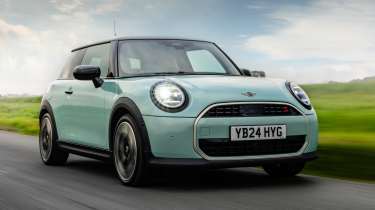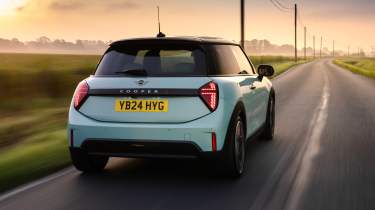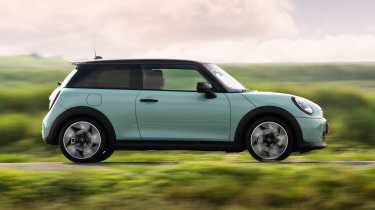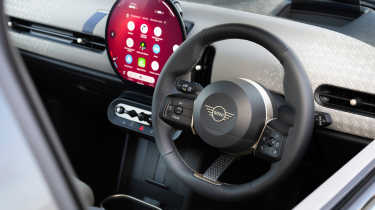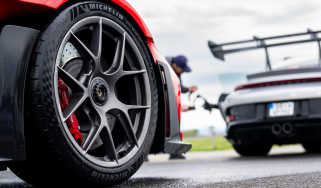Mini Cooper S 2024 review – is the last petrol Cooper S one of the best?
The new Cooper S is one of the few hot superminis that remain on sale in 2024, and the final generation to use a combustion engine
The main thing you notice when climbing into the new Mini Cooper S isn’t its redesigned cabin, smart though it is. It isn’t the animated English bulldog staring at you creepily through the infotainment screen, either (that’s Spike, Mini’s new ‘personal assistant’). No, what strikes you is that no matter how hard you look, there’s absolutely no way to change gear yourself. You can’t get a manual, there’s no automatic shift lever between the seats and you’ll feel for a pair of paddles behind the steering wheel in vain. For a 201bhp petrol hot hatch – a genuine Cooper S – that’s very odd.
Dive into Mini’s online configurator and you’ll find a ‘Sport Automatic Transmission’ option, which thankfully adds paddles on the wheel. It also adds £2500 to the £27,550 list price, because the option is only available with the top-spec Sport trim level. Cheeky. Paddles or not, this new-gen Cooper S promises to deliver Mini’s distinctive hot hatch flavour in a more modern and capable package than ever, at a time when petrol-engined rivals like the Abarth 500, Hyundai i20 N and Ford Fiesta ST have fallen by the wayside.
> 2025 Mini John Cooper Works gets design tweaks but no more power
More reviews
In-depth reviews
Reviews
Despite looking very similar to the electric Cooper SE, the new Cooper S (codenamed F66) rides on a completely different platform to its battery-powered counterpart. Its UKL1 architecture is a development of that from the previous model, and if you put it side by side with the EV, you’ll notice the petrol car’s different side profile and more upright windscreen.
BMW’s B48 2-litre turbo engine provides 201bhp and 221lb ft of torque to the front wheels, with a seven-speed dual-clutch auto being the only transmission available. The electric Cooper SE produces more power and torque, but the S is a massive 320kg lighter at 1285kg and reaches 62mph a tenth quicker, at 6.6sec.
You do feel the effects of the lighter kerb weight on the move – the SE doesn’t feel as heavy as it is, but the petrol car is more nimble and keener to change direction. Despite having different underpinnings there’s obvious shared DNA between the two, with the same over-caffeinated feel we’ve come to know (if not love) from recent hot Minis. The steering is quick and pivots the nose into corners with real tenacity, the throttle response is eager in Sport mode and the ride is constantly agitated, the Mini bobbing along the road and fighting the surface rather than working with it. All this gives the Cooper S an energetic character that can feel overdone when you’re not in the mood, but at the same time reaffirms that you are in fact driving the hottest Mini hatch available (that is until the JCW arrives later this year).
Switching into Go Kart mode dials up the steering weight, drivetrain response and slackens off the stability control, but there is scope to adjust these parameters yourself. That’s a good thing, since Sport for the steering is unnecessarily heavy, and you have the option of completely disengaging the DSC if you wish. The dampers are passive, however, so there’s no ability to calm the ride down. On the rebound stroke in particular it feels tightly wound, the dampers reigning the body in sharply after the initial impact of a bump. This does mean that the body control doesn’t easily get out of shape, which encourages you to use the Mini’s inherent agility at higher speeds.
The most frustrating part of driving the Cooper S quickly is your complete reliance on the gearbox software to pick the right ratio at the right time. The calibration is smooth and well judged for normal driving, with Sport mode being much more aggressive. There are moments when it works well; it kicks down quickly on the brakes to anticipate a quick launch away from corners, and it’ll hold onto gears under light loads to keep the engine primed. Other times the excessive high revs can feel obnoxious when going slowly, and there’s no ability to set the car up for how you want to drive. If you want to downshift to scrub off some speed in anticipation for a corner, you can’t, and if you’d prefer to flick up a gear and use the engine’s midrange, you can’t do that either. You’re robbed of an essential point of interaction and it dampens the experience.
With that said, the B48 motor isn’t exactly the most tuneful or expressive engine to interact with. It is very effective, pulling hard from around 3000rpm and giving the Mini a genuinely rapid turn of pace, but the top end isn’t worth chasing and the soundtrack is flat and monotonous. It does give a sense of big potential in a small car, though, the boost dragging you up the road as the wheel tugs around in classic hot hatch style. Traction is strong too, the Cooper S scrabbling away from slow corners and always seeming to find good drive.
Lean on the Pirelli Cinturatos and there’s positivity in the chassis, albeit with an unusual amount of tyre squeal on some surfaces. The Mini holds its line and there’s even a suggestion of movement at the rear end if you turn in aggressively, which can turn into a bigger slide when backing off the throttle. Generally, the balance is stable and breaking through this can require a heavy-handed approach, but you don’t need to drive around the limitations of the front end as you do in the Abarth 695.
Those Cinturatos aren’t an especially aggressive compound, and you do feel some imprecision in the steering and chassis as you approach the limit. The Mini can sometimes feel quite lead footed when driving it hard, too, perhaps because of the weight build up in the steering and tightness of its damping. It’s fun but more brutal than a Fiesta ST, less balletic across the ground.
Where the Mini comfortably beats pretty much every other supermini is in the quality and design of its cabin. The use of fabrics and ambient lighting projections on the dashboard give it a thoroughly modern, upmarket feel, and the circular OLED infotainment screen is among the clearest and most responsive in the class. There are a few too many functions buried within it (the climate controls, for instance) and it takes a while to find your way around the interface, but the functionality is on par with cars from several classes above.
With near vertical A-pillars and a letterbox windscreen it couldn’t be anything other than a Mini, but the shallow glasshouse means you feel quite enclosed from behind the wheel. The wheel itself is a bit of a disaster. It’s so thick you can barely get your hands around it, and a more delicate, thin-rimmed wheel would be much more suitable for this kind of car.
As Mini pivots towards an all-electric future, the F66 signals the end of the line for the petrol Cooper S. It’s not the most effervescent and engaging model of the lineage – particularly with its standard gearbox configuration – but it combines its new design and tech with classic Mini dynamic traits. If that’s your hot hatch flavour of choice, you won’t find it anywhere else.
Price and rivals
The Cooper S occupies a dwindling sector of the market, with hot superminis like the Abarth 695, Hyundai i20 N, Suzuki Swift Sport and Fiesta ST being axed within the last year or so. That leaves Volkswagen’s Polo GTI as the Mini’s nearest rival, which packs similar power and performance for a £30,195 asking price. And yes, that does include shift paddles for its DSG gearbox.

